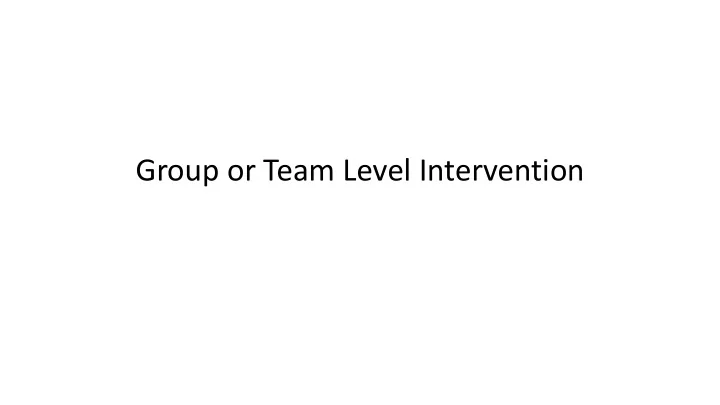

Group or Team Level Intervention
Can We Question the Importance of Teams at Workplace in Present Times? • Executive teams run corporations. • Project teams create new products and services. • Matrix teams help develop everything from banking services, pharmaceuticals to the delivery of services in consulting firms and charitable agencies. • Marketing and sales teams deliver products and services to customers.
Group and Team More specific roles of the members and complementarity in the competencies distinguishes team from a group.
Think about working in team and identify the problem or challenges you might have faced.
Challenges in Team Work Team Mission not clear Personal Likes and Dislikes Sub Optimal Output Ineffective or Negative leadership Conflicts Not able to make decision Poor Team Norms Free riding Incompetence Unable to allocate resources Team do not connect to the larger organization Poor Time Management Unable to manage the project Poor Project Management
Can you Recall the Group-Level Diagnostic Model? Inputs Design Components Outputs Goal Clarity Task Group Group Organization Structure Functioning Effectiveness Design Group Performance Composition Norms Cummings & Worley, 9e (c) 2008 South-Western/Cengage Learning
Challenges in Team Work Challenges Symptoms Focus of Interventions Type – I: Team Problem in Team Constitution, (a) Goal setting Building Lack of clear expectations, Lack of appreciation for (b) Role clarification difference in style of working emphasizes (c) Task structure Type II: Ineffective group norms Team Performance Few members not getting along (a) Performance norms well with each other Inefficient time and resource (b) Group functioning management, Poor project planning, Inability in decision making and problem solving Type III: Inability of the team to recognize its connection with the larger organization
Why Team based Interventions are Important • Team building is an effective approach to improving teamwork and task accomplishment. • Team building can facilitate other OD interventions such as: Employee involvement Work design Restructuring Strategic change
Team Building Activities • What is the first step in starting team based OD interventions? Ans.: Diagnosis • How? Ans.: Performance data, Time log, Perception of the managers, business leaders, members of the team and Observations of the other stakeholders
Team Building Activities Suggest or speculate the appropriate OD interventions in the following cases/situations: • Members in a consulting team do not follow the timelines for internal communication, interrupt each other during the meetings and do not follow through the team decisions. • Members of the Executive committee of a manufacturing plant (Ops Head, Quality Head, Production Head, Fin. Head) are giving separate and some time contradictory instructions to the team members. • A team with an excellent track record, passionate leader and committed members has started showing the sign of derailment. • A team getting outcomes of their activities which no body likes or proud of.
Team Building Activities Challenges Focus of Intervention Interventions Type – I: Team (a) Goal Clarity (a) Expectation setting, Team objective Building and Role clarification setting, Performance and reward mechanism (Forming and Team role Analysis, Role Negotiation Storming stage of team (b) Task structure (b) Coordination among the members Building) and regulation of their behavior about work method , production goals (c) Group composition (c) Complimentary knowledge, skills and attitude; accommodation as per the needs for achievement, inclusion and belongingness
Team Building Activities Challenges Focus of Interventions Interventions Type II: (a) Decision making, Team Performance (a) Team functioning Project management, (b) Performance Problem solving, norms Design thinking (b) Changing norms, Risk taking, Trust, Improving communication
Sustaining the Long term Effects of Off site Team Building • Personal Management Interview (PMI) is recommended as a follow up intervention that arrests the potential fade-out effects of off site team building. • PMI is found to be effective in sustaining the long term effects of off site team building. • Through the PMI a Team Leader negotiates roles with each team member to resolve problem and increase personal accountability. Boss, R. W. (2019). Preventing regression in team building. Handbook of Organizational Consultation, Second Editon , 139.
Team Building Activities Challenges Focus of Interventions Interventions Type III: Inability of (a) Organization al (a) Strategic planning the team to objectives recognize its (b) Stakeholder mapping connection (b) Systems with the larger perspective (c) Intergroup organization collaboration
Team Building Activities Situations for OD interventions and the intervention used by the expert in real life situation: • Members in a consulting team do not follow the timelines for internal communication, interrupt each other during the meetings and do not follow through the team decisions. Team Processing after the Team observations • Members of the Executive committee of a manufacturing plant (Ops Head, Quality Head, Production Head, Fin. Head) are giving separate and some time contradictory instructions to the team members. Role Negotiation method • A team with an excellent track record, passionate leader and committed members has started showing the sign of derailment. Connecting back the team to the strategic objectives of the organization • A team getting outcomes of their activities which no body likes or proud of. Leadership Development
Team Building in Virtual Teams • When communication technologies are augmented to include goal setting processes, team functioning and team performance improved. • Dialogue intervention intended to improve shared mental models is found to be effective in face-to-face teams as well as in video conferenced teams. • Virtual and geographically dispersed teams can also take advantage of a variety of asynchronous facilitation tools such as wikis, shared portals, or other groupwares.
Team Building in Virtual Teams • Interpersonal closeness between members of a virtual team is created when one member proactively helps another members to solve a problem or address a concerns. • The closeness is maintained by frequent, short, but content- oriented (as opposed to process oriented) message. • Team performance is enhanced by initial face-to-face team building meetings in the start-up stage of a team work.
Recommend
More recommend